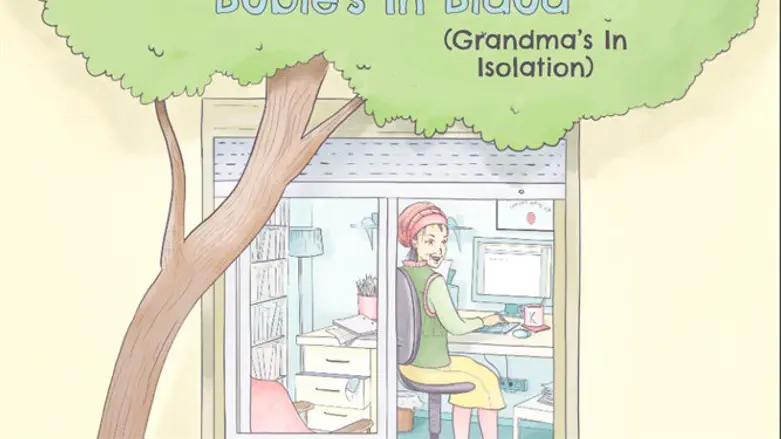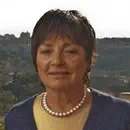
If I were asked to name the biggest reward that comes with raising children, I would skip all the naches mine have brought me – sorry guys – and go straight to their being the reason I am a grandparent. What unadulterated love, trust, light and pure delight grandchildren bring! And with the wisdom gained about what counts in life as the years go by, G-d willing, we can simply enjoy and appreciate the gift of being here to watch them grow.
These youngsters also grant us the opportunity to give over family lore, traditions, and as time goes on, provide an attentive ear and sounding board, give gentle guidance and advice when they ask for it, as they sometimes do, a request which is the greatest compliment there is no matter what the grandparent's accomplishments were in his or her younger years.
And while much of this is possible on Zoom and whatsapp video, or from behind expression-hiding masks and at a distance of two meters, it is certainly not the same. Hardest of all is not being able to give the little ones their usual warm hugs and kisses.
After 8 months of carefully following Health Ministry rules, as do all the grandparents I know, veteran grandma Karen D. Guth went an empathetic step further and thought not only about her feelings at missing the children, but of how they feel about life during the pandemic. It must be inexpressibly difficult for children, she writes in her introduction, to understand why something they cannot see has changed their lives.
For young preschool or early primary school children, the security and familiarity of seeing Grandma (Bubie in Yiddish to some, Savta in Hebrew to others) and Grandpa (Zadi or Saba) have literally disappeared. They have turned into either disembodied voices or prisoners in a Zoom frame who can't get out. Some children, who see them from outside the house, are afraid of grandparents wearing masks.
Very young children must be wondering how and why this has happened, and heaven forfend – may even begin to think that this is normal.
Grandma Karen Guth wrote a straightforward, optimistic book Grandma is in Isolation, tailored for these young children, aimed primarily at the religious and haredi sector, that does not go into a description of the disease or the virus, but explains what bidud (isolation) entails. It describes how Bubie is careful about the rules and how although she misses them, especially hugging and kissing them, she keeps busy while confined to her home.
Bringing hidden fears out into the open, "it won't help to be scared" she says, adding that our Rabbis have taught us that "the cure was created before the disease." She adds that we have to be careful to stay healthy and we must have faith that the vaccine will very soon reach us. (I rewrote the line about the vaccine, obviously written before it became available a short time ago, to reflect the current situation).
All in all, she writes, "…the time is a challenge for us. But trust that in the future, with not long to wait, we will all be together again…laughing and playing.."
The book can inspire confidence in young children about the future by talking about the faith in that future. It also shows healthy, loving family relationships in a matter-of-fact way.
Children's stories must have happy endings, it is believed, which explains the repeated "and they lived happily ever after" mantra of fairy tale fame. The writer of Bubie's in Bidud (Grandma's in Isolation) ends on a particularly hopeful and anticipatory note by describing the picnic the entire family will enjoy together once this period has passed. (Hopefully, that is not a fairy tale!)
Meital Maor's softly colored, lovely and cheerful illustrations and graphic design are perfect for the text, starting with a drawing showing the grandchildren waving at Bubie from a distance as she stands at the window of her home to the one of a family picnic with which the book ends.
Gearing it for the observant, although suitable for all children, with Bubie in a head covering, girls in skirts, boys and Zedi with kippot, the writer did Israeli and Anglo grandparents a service by incorporating the text and pictures in both Hebrew and English in the same book. The English, edited by Jennifer Mayer is read from the left book cover and the Hebrew translation by Michal Yechieli Copenhagen from the right cover. Anglos who read books to their grandchildren in English, will be able to use the English. Those who translate English books into Hebrew as they go along, will not have to do that here, while parents or those children who can read can avail themselves of the Hebrew.
Does this book have a short life as the vaccination becomes the norm? Maybe, but maybe not. Whenever I write on children's books, I let my grandchildren express their opinions. This time, I made use of the parshat shavua (Shabbat Torah reading)Zoom meeting I have several times a week for the 10-13 year olds and invited a 7 year old granddaughter to join as I read them the book and put several illustrations on the share screen. Their comments showed me the need to pay attention to youngsters' perceptions of their surroundings.
Dovie and Chai said that the book is important to show future generations of children what it was like during the pandemic so they can "know about how hard it was for us" (!) and not forget it. Bahr said that the book succeeds in being realistic, tangibly demonstrating the way life is during the pandemic, while it shows future generations how we all felt, not just what we did to cope.
Elkanah Dov said that while he liked the whole book, the Savta who misses hugging her grandchildren went straight to his heart, and the youngest, Yaeli, nodded wide-eyed as I read it to the group. You could see how she related to the illustrations – they were pictures of her life. I live next door and she was used to popping in often to open her special drawer with paper, stickers, scissors and crayons, in addition to treats and storytelling, but now she waves at me every day as I stand on my porch just like the Bubie (she calls me Savta) in the story.
Karen Guth actually wrote the book for her own grandchildren, thereby doing all grandparents a service. She and her husband made aliya to Efrat in 2000, and she coordinates the English Department in the Mekor Chaim Yeshiva in Gush Etzion and teaches in another local high school. Her grandparents' blog is called Tell Me A Story, Bubie, and is worth a closer look for future story telling ideas .
https://www.tellmeastorybubie.com/bubies-in-bidud.html
Rochel Sylvetsky is op-ed and Judaism editor at Arutz Sheva.
